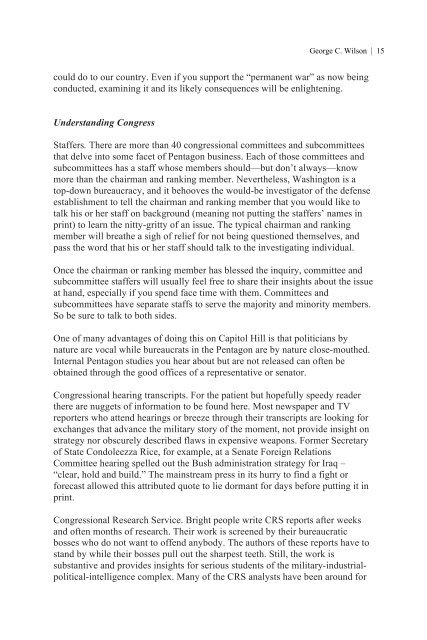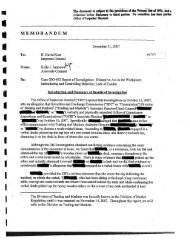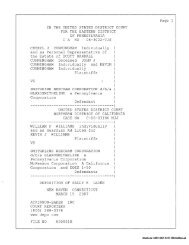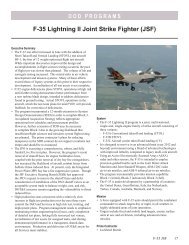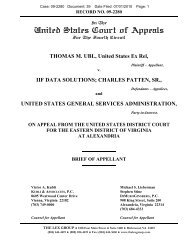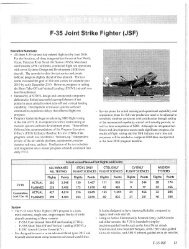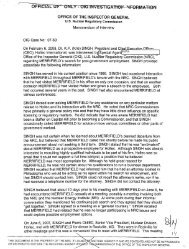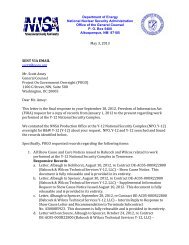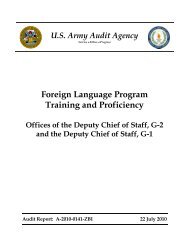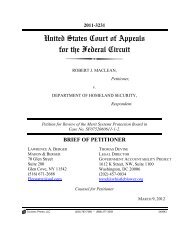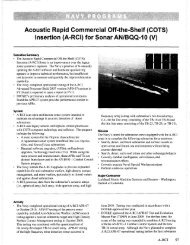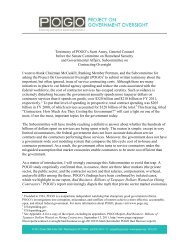The Pentagon Labyrinth
The Pentagon Labyrinth
The Pentagon Labyrinth
Create successful ePaper yourself
Turn your PDF publications into a flip-book with our unique Google optimized e-Paper software.
could do to our country. Even if you support the “permanent war” as now being<br />
conducted, examining it and its likely consequences will be enlightening.<br />
Understanding Congress<br />
George C. Wilson | 15<br />
Staffers. <strong>The</strong>re are more than 40 congressional committees and subcommittees<br />
that delve into some facet of <strong>Pentagon</strong> business. Each of those committees and<br />
subcommittees has a staff whose members should—but don’t always—know<br />
more than the chairman and ranking member. Nevertheless, Washington is a<br />
top-down bureaucracy, and it behooves the would-be investigator of the defense<br />
establishment to tell the chairman and ranking member that you would like to<br />
talk his or her staff on background (meaning not putting the staffers’ names in<br />
print) to learn the nitty-gritty of an issue. <strong>The</strong> typical chairman and ranking<br />
member will breathe a sigh of relief for not being questioned themselves, and<br />
pass the word that his or her staff should talk to the investigating individual.<br />
Once the chairman or ranking member has blessed the inquiry, committee and<br />
subcommittee staffers will usually feel free to share their insights about the issue<br />
at hand, especially if you spend face time with them. Committees and<br />
subcommittees have separate staffs to serve the majority and minority members.<br />
So be sure to talk to both sides.<br />
One of many advantages of doing this on Capitol Hill is that politicians by<br />
nature are vocal while bureaucrats in the <strong>Pentagon</strong> are by nature close-mouthed.<br />
Internal <strong>Pentagon</strong> studies you hear about but are not released can often be<br />
obtained through the good offices of a representative or senator.<br />
Congressional hearing transcripts. For the patient but hopefully speedy reader<br />
there are nuggets of information to be found here. Most newspaper and TV<br />
reporters who attend hearings or breeze through their transcripts are looking for<br />
exchanges that advance the military story of the moment, not provide insight on<br />
strategy nor obscurely described flaws in expensive weapons. Former Secretary<br />
of State Condoleezza Rice, for example, at a Senate Foreign Relations<br />
Committee hearing spelled out the Bush administration strategy for Iraq –<br />
“clear, hold and build.” <strong>The</strong> mainstream press in its hurry to find a fight or<br />
forecast allowed this attributed quote to lie dormant for days before putting it in<br />
print.<br />
Congressional Research Service. Bright people write CRS reports after weeks<br />
and often months of research. <strong>The</strong>ir work is screened by their bureaucratic<br />
bosses who do not want to offend anybody. <strong>The</strong> authors of these reports have to<br />
stand by while their bosses pull out the sharpest teeth. Still, the work is<br />
substantive and provides insights for serious students of the military-industrialpolitical-intelligence<br />
complex. Many of the CRS analysts have been around for


